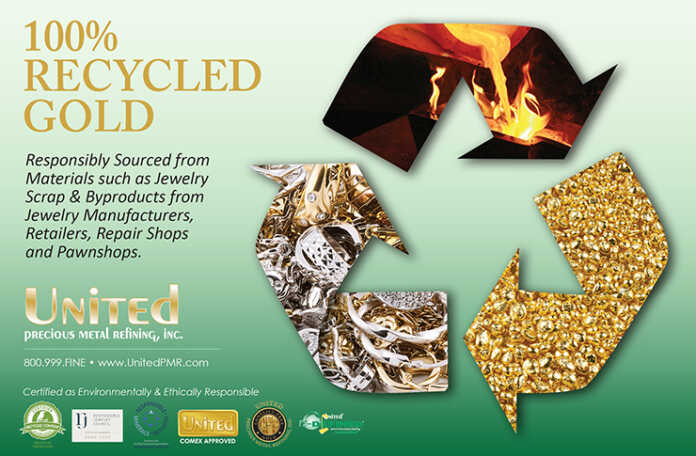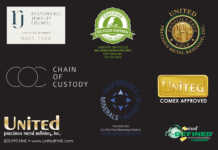
United Precious Metal Refining, Inc. (UPMR) is the largest US-owned full service primary refiner for GOLD, SILVER, PLATINUM, and PALLADIUM in the nation. Since 1988, UPMR continues to responsibly source 100% recycled gold and silver from materials such as jewellery scrap & byproducts from jewellery manufacturers, retailers, repair shops and pawnshops. Pawnshops play a pivotal role in purchasing scrap jewellery from the public that gets sent in for refining and recycling for use in our 100% recycled gold and silver products.
The gold collected around the world is shipped to UPMR where it is refined and recycled to make new products for jewellery manufacturing, such as Karated Grain, Solder, Wire, Sheet, Plate and Tube; all made using 100% recycled gold and silver.
Their success in the precious metal industry is due to their commitment to the environment and their ongoing efforts to ensure they only process and refine gold and jewellery scrap from verified sources. Because UPMR supplies metals to some of the industry’s largest manufacturers, who are also conformant with responsible sourcing and environmental certifications and policies, UPMR is certified by numerous organizations such as: Responsible Jewellery Council (RJC): Code of Practices, Responsible Minerals Initiative (RMI – RMAP), and SCS: Global Services.
Working with the SCS and the RBA/RMI, UPMR has paved the way for this niche business model focused on recycling that works for the jewellery industry, ensuring responsible sourcing and 100% recycled gold. UPMR’s unique operation caters to the jewellery industry offering precious metal refining services, a vast catalog of jewellery products, an impressive research & development facility and analytical laboratory, and the highest level in customer service for jewellers and manufacturers alike.
In UPMR’s analytical laboratory, extensive testing is done to identify the elements in the gold samples from every lot ensuring no evidence of mining material is detected. Lead (Pb), Chrome (Cr), Iron (Fe), Mercury (Hg) and Arsenic (As) are often identified in mining materials and can be detected utilizing the standard X-ray Fluorescence (XRF) analysis. The benefit of the XRF analysis is its expediency in a rapid test that allows you to identify the minerals in the sample. Not every XRF machine is programmed to identify these elements as standards are needed to program these devices to properly function. The XRF machines at United’s lab are programmed with hundreds of standards to ensure accuracy in identifying the elements in the samples being analyzed.
Beryllium (Be) cannot be identified through X-ray but can be detected utilizing an ICP (Inductively Coupled Plasma) analysis. An ICP analysis is a destructive analytical method used to detect and measure elements in chemical samples to a parts-per-million level of accuracy. Extremely small traces of metals can be detected using this equipment. The process is based on the ionization of a sample by an extremely hot plasma, usually made from argon gas. It has the ability to identify many more elements in a sample than the standard XRF analysis.
The team at UPMR, consisting of executive management, customer account management professionals and compliance personnel, work with customers on an ongoing basis to ensure they are conformant with the policies set forth by UPMR. Customers who send in melted materials from regions of the world identified as high risk or CAHRAs (Conflict Affected and High-Risk Areas) are required to document and photograph the jewellery scrap on a scale before melt as well as the bar on the scale after being melted. Video of the melting process is often requested to ensure compliance and to verify that the gold received does in fact come from jewellery sources and is not mixed with mining material.
Recognized for their commitment to the environment and meticulous implementation of compliance procedures to ensure responsible sourcing, UPMR is proud to service tens of thousands of customers worldwide.
















